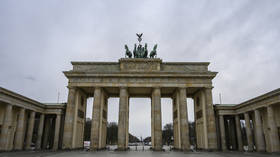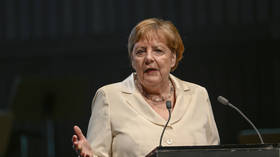Germany in recession with economy in worst plunge since global financial crisis

Germany’s economy shrank by 2.2 percent in the first quarter compared to the final three months of 2019, preliminary official statistics have shown. It’s the biggest slump in a decade for Europe’s largest economy.
Figures for the final three months of 2019 were revised to show a contraction of 0.1 percent, which means German GDP growth has been negative for two consecutive quarters, the technical definition of a recession.
The numbers are expected to get worse; Germany’s Statistical Office has forecast a ten percent plunge in GDP for the second quarter, depending on the success of lifting lockdown measures. More than 370,000 people lost their jobs in April alone due to coronavirus-caused shutdowns.
Recent data showed a 15.6 percent month-on-month decrease in factory orders in March, and a 9.2 percent drop in industrial production.
Also on rt.com EU economy set to contract 7.5% this year in worst economic shock since Great DepressionThe German economy’s decline, however, is not as bad as in some neighboring countries. France and Italy have posted first-quarter contractions of 5.8 percent and 4.7 percent respectively.
The German government has already announced some 1.2 trillion euros ($1.3 trillion) to support the nation’s businesses. Finance Minister Olaf Scholz has promised a stimulus program in early June that will focus on investing in a “modern and climate friendly future.”
The country started loosening lockdown restrictions on April 20. Shops have now reopened; restaurants are gradually opening up and auto production has also restarted.
For more stories on economy & finance visit RT's business section













